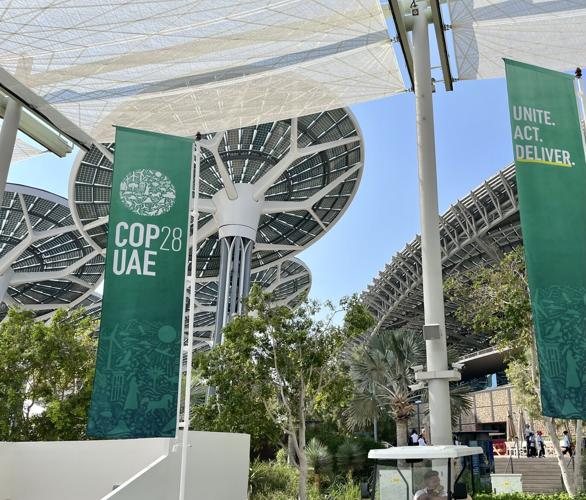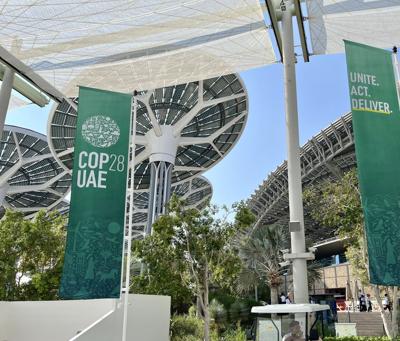“What an honor.”
That was how recent Penn State alumna Olivia McMahon described her experience last month when she attended the 28th Conference of the Parties to the United Nations Framework Convention on Climate Change, commonly known as COP28.
Among the heads of state and world leaders that met in Dubai from Nov. 30 to Dec. 13 of last year was a select delegation of Penn State community members.
McMahon, a 2023 graduate with a degree in energy and sustainability policy from Penn State World Campus, attended the second week of the conference to talk about her experience in the Local Climate Action Program.
The LCAP consists of two three-credit courses over a fall and spring semester where “students are partnered with Pennsylvania municipal governments to help them do greenhouse gas emission inventories” and “climate action planning,” according to the program’s co-director, Brandi Robinson.
McMahon was paired with Bucks County, Pennsylvania for her LCAP, along with another student.
“It was probably the best educational experience I’ve had in my life,” McMahon said. “I learned so much doing it.”
The summer following the LCAP, McMahon completed her capstone project by continuing her work and completing the municipality’s climate action plan.
When she traveled to Dubai, United Arab Emirates for the COP28, McMahon spoke on the “Youth and the Role of Universities in Fostering Climate Solutions” panel about her experience with the LCAP.
“I really got an understanding of the role that a university can play in creating spaces for collaboration,” McMahon said. “Just being able to bring the right people together to work effectively on problems, whether it be for climate or anything else.”
For McMahon, COP28 had an “underlying positivity” she didn’t expect to find given the way she’d “seen it portrayed in the media.”
“It’s thousands of thousands of people who are all extremely committed to the work that they’re doing,” McMahon said. “For me, personally, there was a thread of the importance of local climate action that was woven throughout all kinds of different things that I saw.”
At any given time, COP28 hosted “all different types” of sessions and panels, McMahon said.
“(The ESP program) … does a very very good job at getting you well-versed in a topic that is just so massive,” McMahon said. “I can honestly say I had no trouble walking into any of those rooms and understanding exactly what people were saying.”
McMahon worked previously as a scientific glassblower in a large research facility, but when she had the chance to “mix up (her) life a little bit and pursue something else,” she was “thrilled” to find the world campus program that matched her interest in climate.
“I’m a returning student, I have a daughter,” McMahon said. “The flexibility that World Campus afforded me is what allowed me to do this.”
In looking to the future, McMahon said she feels “more inspired.”
Though she said she has always believed in the importance of local action, McMahon said she feels a “deeper ingrained sense” of it following COP28.
“After this whole experience, I have a better understanding of how important universities are in solving problems,” McMahon said. “I just feel so very, very fortunate that I have been able to study under the most wonderful professors.”
Robinson, an associate teaching professor in the department of energy and mineral engineering, has been working with McMahon for years as an adviser in the ESP program.
“I’m just in awe of her ability to balance everything and be such a focused, dedicated, exceptional student. She just really went above and beyond,” Robinson said. “She was a real asset to the LCAP program last year … she has an ability to be very poised when she is engaging with these local government officials, she’s very meticulous in her work and thorough … I was really excited for her to have an opportunity like that.”
Robinson said last year was her “first chance” to attend UN climate negotiations.
Robinson said COP28 was a “life-changing experience” and the highlight of her career “hands-down.”
“For those of us who work in anything related to climate, that is just like the ultimate experience to have — is to be able to go to a COP.”

Penn State alumna Olivia McMahon and faculty member Brandi Robinson at the 28th Conference of the Parties to the United Nations Framework Convention on Climate Change in Dubai
After making commitments to address climate change through the Paris Agreement, developed at COP21 in 2015, Robinson said this year’s conference was a global stocktake to see if delegates are on track.
For Robinson, while more needs to be done, the hope at COP28 is “absolutely palpable.”
“A lot of the news that filters out of an event like that is focused on conflict and disagreement,” Robinson said. “But … it is just undeniable when you are there that everyone there is trying so hard to get this right.”
Much of the climate work happens in local communities, which “absolutely matters,” Robinson said.
The LCAP, for example, is completely online and mostly asynchronous, meaning students can be and are involved from all over the world.
“We don’t have to be sitting in the same room to get some of this work done,” Robinson said. “It helps us reach a wider audience, and I would love to students from some of our commonwealth campuses participate, as well.”
The LCAP is open to any third or fourth-year undergraduate in good academic standing.
Erica Smithwick, a distinguished professor of geography and director of the Earth and Environmental Systems Institute, organized the Penn State delegation for the UN conference.
Smithwick said Penn State recently launched a Climate Consortium in an “effort to bring together climate research and activities across the university to advance and amplify our work.”
One of the things the consortium wanted to do was find a way to be present at a COP. After receiving approval on Penn State’s end, Smithwick said the university’s delegation had to apply for badges to the conference.
“The idea was that we were going to showcase Penn State’s leadership in climate research and impact and … form collaborations with other universities and other organizations at this event,” Smithwick said.
Smithwick said COP28 meant “lots more opportunities to engage” but had to be balanced with “cost, resources and the carbon footprint.”
“To be at a meeting like this where people are coming together from all over the world and are literally working on this hard problem, it’s very, very inspiring,” Smithwick said. “You leave there with new ideas and … examples of how that work is being done.”
Currently, Smithwick is “hopeful” Penn State will be able to attend another COP and engage in this process regularly to show that universities have a role to play in climate solutions.
MORE CAMPUS COVERAGE
Over 100 Penn State entrepreneurs gathered for the second annual CommunENTI event on Wednesd…






